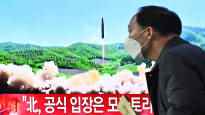A new type of missile developed by North Korea is flying farther than ever before. The country is also suspected of continuing to develop nuclear weapons.
Japan and South Korea reported today that North Korea launched an intercontinental ballistic missile for the first time since 2017.
The missile flew to an altitude of 6,200 kilometers and had a range of 1,080 kilometers. This is higher and farther than any missile previously fired by North Korea.
The missile hit the sea 150 kilometers from the Japanese island of Hokkaido. According to Japan, the missile hit its exclusive economic zone.
North Korean missiles are evolving and are increasingly being launched
North Korea froze its ballistic and nuclear missile test program in 2018 after the country’s leader Kim Jong-Un met the then President of the United States Donald Trumpin.
However, ground missile tests have picked up again. The missile test taken today is the 11th this year.
According to North Korea, it is testing various satellites designed to track the movements of U.S. and allied soldiers.
North Korea has developed ever larger and more missile missiles.
It introduced its Hwasong-17 missile in October 2020 and 2021. The missile was carried by an 11-axle truck and is considered one of the world’s largest intercontinental ballistic missiles to be carried on the road.
South Korea responded with its own missile tests
Shortly after North Korea’s missile test, South Korea said it had fired several ballistic and tactical missiles.
– Our army fired missiles from land, sea and air into the sea east of the country after North Korea had conducted its missile test, a spokesman for the country’s staff Kim Joon-Rak said.
South Korea also said it had identified a base from which the North Korean missile was launched and added that it would be able to destroy it if necessary.
Also nuclear weapons test site movement
North Korea said it closed and dismantled it after talks with Trump in 2018.
The country even presented videos to the international media showing places being blown up in the area.
CEO of Korea Risk Group think tank interviewed by news agency Reuters Chad O’Carrollin the risk of escalation is high.
“Nuclear tests, increased military exercises between the United States and South Korea, and a new Conservative president in South Korea are creating a framework for revenge-based chain reaction,” he said.
According to O’Carroll, North Korea is now able to develop new and more effective weapons quite freely, as the UN Security Council has not reached a consensus on sanctions against the country.
